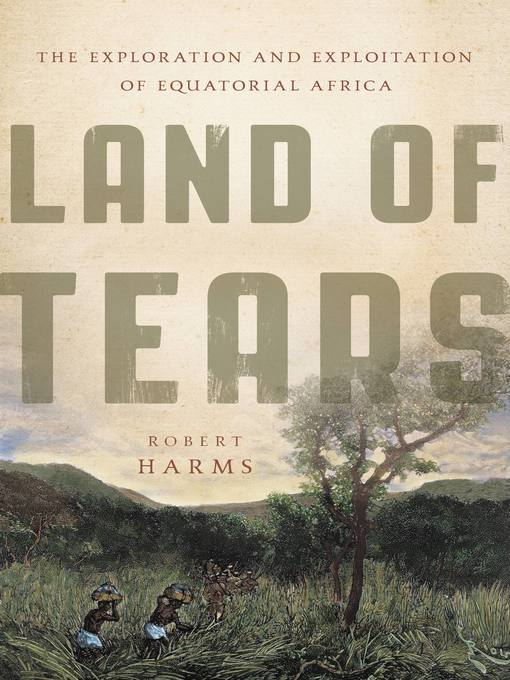
Land of Tears
The Exploration and Exploitation of Equatorial Africa
کتاب های مرتبط
- اطلاعات
- نقد و بررسی
- دیدگاه کاربران
نقد و بررسی

Starred review from November 1, 2019
Fresh interpretation of the 19th-century race to colonize the interior of sub-Saharan Africa. As Harms (History and African Studies/Yale Univ.; Africa in Global History With Sources, 2018, etc.) writes, the Congo Basin rainforest was long isolated, difficult to access, and lacking well-developed trade routes. This changed in the 19th century, when exploration on the part of explorers like Richard Francis Burton and David Livingstone was met by the arrival, in the eastern interior, of Arab and Swahili traders who took slaves and ivory to the Zanzibar coast--and then, with the assistance of Henry Morton Stanley, that of the forces of the king of Belgium, whose colonization of the Congo was among the most brutal of any in human history. The last aspect has been well documented in works such as Adam Hochschild's King Leopold's Ghost, but Harms contributes significantly to the literature by explaining how these various intrusions were linked and fueled each other--and more, how Belgian colonization inspired further intrusions by other European powers. Livingstone, for example, had been traveling with those very Arab ivory and slave traders for years while the Italian-born explorer Pietro Savorgnan di Brazza pressed French claims along the Congo, helping the cause by mounting awe-inspiring fireworks shows for the local chiefs and their followers, after which he would "threaten to call war down upon them if they did not cooperate." The stratagem was effective. The intruders, writes the author, soon become something more. They "were no longer explorers but were state builders," states that did not have the benefit of being built with the consultation of the native peoples. Those peoples suffered and died in the spice plantations on the Indian Ocean coast, in mines, and on rubber plantations deep in the forest even as Stanley, an architect of genocide, enjoyed a funeral service in Westminster Abbey and the Zanzibari slave trader Tippu Tip became the wealthiest man in the land save for the sultan. An exemplary work of history and a somber account of a colonial enterprise that has crippled Africa to this day.
COPYRIGHT(2019) Kirkus Reviews, ALL RIGHTS RESERVED.

December 1, 2019
With this newest work, Harms (Henry J. Heinz Professor of History and African Studies, Yale Univ.; The Diligent: Worlds of the Slave Trade) mines several sources to show how the European "pillage of the human and natural resources of the Congo rainforest" at the end of the 19th and beginning of the 20th centuries brought about the disintegration of social and political institutions on the African continent. This subject has been covered before, notably in Adam Hochschild's King Leopold's Ghost along with biographies of Henry Morton Stanley, Leopold's primary agent in Africa. Harms devotes less space to analysis of or speculation about the psychological and emotional motivations of the varied actors in this history of atrocities; rather, the author focuses on how those actors at the very outset of globalization exploited the "civilized" world's demand for natural resources, largely ivory and rubber. He also factors in how countries such as Belgium were indifferent to the destruction of African societies in their attempt to build empires, however short-lived the empires were. VERDICT Essential reading for serious students of modern African history.--Joel Neuberg, Santa Rosa Junior Coll. Lib., CA
Copyright 2019 Library Journal, LLC Used with permission.

January 13, 2020
Harms (Rivers of Wealth, Rivers of Sorrow), a professor of history and African studies at Yale University, delivers an impressively fine-grained account of the pivotal era from the 1870s through the early 1900s when the African slave trade was supplanted by the commercial trade in rubber and ivory, triggering the “Scramble for Africa” and European colonization of the continent. The story of Equatorial Africa’s brutal subjugation to satisfy the demands of American and European consumers is told through the eyes of three key figures: Henry Morton Stanley, a Welsh explorer employed by King Leopold II of Belgium; Pierre Savorgnan de Brazza, an Italian who worked in the service of France; and Hamid bin Muhammad (known as Tippu Tip), a mixed African-Arab trader employed by the Sultan of Zanzibar and later by King Leopold. Drawing on these men’s autobiographies, as well as other eyewitness testimonies and archival sources, Harms skillfully relates how Arab ivory hunters first penetrated the Congo basin rainforest, how rubber concessions moved in when the ivory trade was depleted, and how African villagers attempted to organize and fight back against foreign intruders who “flogged, enslaved, imprisoned, and shot” natives in their quest to drain resources from what is now the Democratic Republic of Congo and the Republic of Congo. Meticulously researched and written in a thoroughly engaging style, this exhaustive chronicle offers essential insights into the history of imperialism.

























دیدگاه کاربران